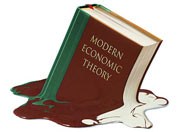The current crisis questioned the extent to which economics has produced “useful” knowledge, in particular the areas of macroeconomics and financial economics. There has been another round of criticisms and of defenses that may interest historians and economists alike.

The July 18th edition of The Economist had in its cover a melting wax-like book titled “Modern Economic Theory”. In it there are two interesting articles appraising the developments in macroeconomics and in financial economics (and the hypothesis of efficient markets) and the problems these economists have had in dealing with the crisis.
After that, the Nobel Laureate Professor of Chicago, Robert Lucas, has written an article to the magazine noting that:
both pieces were dominated by the views of people who have seized on the crisis as an opportunity to restate criticisms they had voiced long before 2008. Macroeconomists in particular were caricatured as a lost generation educated in the use of valueless, even harmful, mathematical models, an education that made them incapable of conducting sensible economic policy. I think this caricature is nonsense and of no value in thinking about the larger questions: What can the public reasonably expect of specialists in these areas, and how well has it been served by them in the current crisis?
Lucas goes on to defend Fama and the efficient hypothesis market and to argue against the “caricatures” in The Economist‘s briefings (in the macro piece, mainstream macroeconomics is referred to as “dark age of macroeconomics”). He recasts his view that the crisis is an adverse shock that has being dealt with by many macroeconomists over the last two years. In doing so, these economists have “drawn on recently developed theoretical models when they judged them to have something to contribute. They have drawn on the ideas and research of Keynes from the 1930s, of Friedman and Schwartz in the 1960s, and of many others.”
More recently, a new round of criticisms has started in the United Kingdom. The Queen has visited the London School of Economics on November 5th last year and has asked there why had no economists noticed the crisis that was on its way? On July 22nd, 2009, Professors Tim Besley (LSE and external member of the Bank of England monetary policy committee) and Peter Hennessy (Department of History, Queen Mary, University of London), on the behalf of the British Academy, wrote a letter to the Queen giving the consensus view that emerged during a forum promoted by the British Academy a few days earlier, whose theme was “The Global Financial Crisis: Why Didn’t Anybody Notice?” They summarize this view as following:
So in summary, Your Majesty, the failure to foresee the timing, extent and severity of the crisis and to head it off, while it had many causes, was principally a failure of the collective imagination of many bright people, both in this country and internationally, to understand the risks to the system as a whole.
A group of ten dissident British economists felt that Besley and Hennessy’s letter did not address the heart of the issue: “that in recent years economics has turned virtually into a branch of applied mathematics, and has been become detached from realworld institutions and events.” They wrote another letter to the Queen explaining their position. Among them, one finds Sheila Dow (University of Stirling), Geoffrey Harcourt (Emeritus, University of Cambridge, University of Adelaide), Geoffrey Hodgson (University of Hertfordshire), and Malcolm C. Sawyer (University of Leeds).
Let’s see what comes next.
